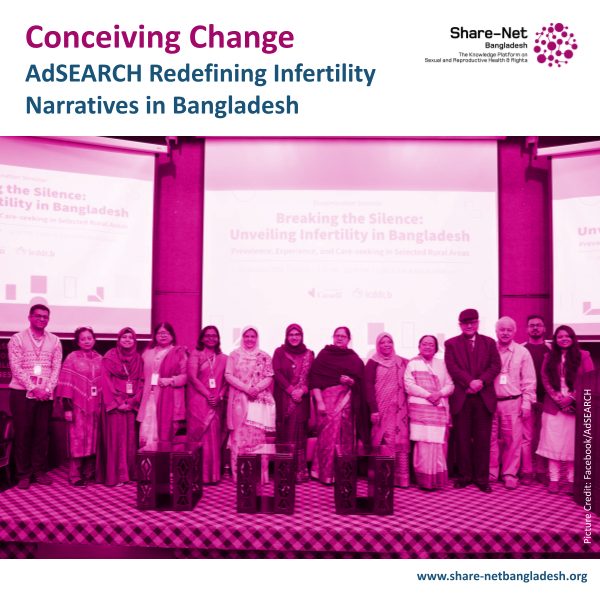Conceiving Change: AdSEARCH Redefining Infertility Narratives in Bangladesh
In Bangladesh, the chapter on infertility has long been etched in the shadows, overshadowed by societal misconceptions and a historical tendency to place the burden disproportionately on women. This silent struggle, often fraught with personal agony and societal stigma, has endured through the years. Only recently has there been a seismic shift in perspectives, as the nation acknowledges the profound implications of infertility on Sexual and Reproductive Health and Rights (SRHR).
In a pivotal moment for reproductive health, the icddr,b hosted a groundbreaking seminar titled ‘Breaking the Silence: Unveiling Infertility in Bangladesh.’ This event, held on January 23, 2024, at the icddr,b Sasakawa Auditorium, aimed to shine a light on the prevalence, experiences, and care-seeking behaviors related to infertility in selected rural areas of Bangladesh.
Renowned gynecologist and obstetrician, Dr. T A Chowdhury, set the tone by emphasizing the transformative shift in societal perspectives on infertility. Historically, blame was disproportionately placed on women, neglecting the role of men. Dr. Chowdhury highlighted, “Times have changed, and there is now a more inclusive approach to infertility treatment.”
The seminar commenced with a warm welcome from Dr. Shams El Arifeen, the Project Director of AdSEARCH by icddr,b. Preliminary findings were presented by Farah Naz Rahman, Shanaj Sultana Sathi, and M Moinuddinn Haider, shedding light on the prevalence of infertility and health-seeking behaviors of infertile couples, along with the social implications and care-seeking experiences.
The following panel discussion featured experts such as Prof. Farhana Dewan, President of the Obstetrical and Gynaecological Society of Bangladesh (OGSB), and Prof. Firoza Begum, President of the Feto-Maternal Medicine Society of Bangladesh. They emphasized the overlooked human rights aspects of infertility in global and national Sexual and Reproductive Health and Rights (SRHR) policies.
“Infertility is an emerging public health problem, strongly linked to several Sustainable Development Goals,” said the panelists, underlining the need for a more comprehensive approach to infertility treatment within the country. Dr. Ahmed Ehsanur Rahman presented a forward-looking plan to address the challenges outlined during the seminar.
The comprehensive cross-sectional study conducted by AdSEARCH covered Matlab and Baliakandi upazilas from October to December 2022, involving 2,948 currently married women aged 20-49. Shockingly, despite its significant impact on human rights, infertility remains neglected in both global and national SRHR policies.
Globally, approximately 49 million couples grapple with infertility, and Bangladesh is no exception. The seminar not only shed light on the prevalence of the issue but also unveiled the limited information available on the experiences of infertile couples in the country.
This event marks a crucial step in breaking the silence surrounding infertility in Bangladesh. By bringing together experts and stakeholders, the seminar provided a platform to discuss the challenges, opportunities, and the way forward in addressing infertility from both men’s and women’s perspectives. As the world strives to achieve the Sustainable Development Goals, acknowledging and addressing infertility is paramount to ensuring the fulfillment of sexual and reproductive health rights for all.
Source: AdSEARCH by icddr,b

